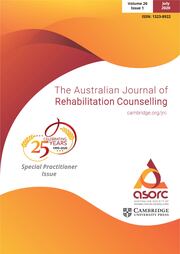Article contents
Increasing Research Familiarity Among Members of a Clubhouse for People With Mental Illness
Published online by Cambridge University Press: 15 October 2015
Abstract
This study describes a project that aimed to train people with mental illness in introductory research skills to support the development of a Clubhouse. Eight mental health consumers from the Illawarra region in New South Wales, Australia were recruited to participate in the project. The group met weekly over a 10-week period to participate in training sessions. The training program focused on increasing familiarity and confidence with research related activities considered useful for Clubhouse members. Measures related to Familiarity with the Clubhouse model, Clubhouse Role Confidence, Research Self Efficacy, and Familiarity with Research Terminology were completed by six of eight participants before and after training. There were significant improvements in consumer's familiarity with components of the Clubhouse and research terminology. There was also increased confidence in performing roles relevant to research activities in Clubhouse settings but no significant improvements in Research Self efficacy related to more general research skills. There is a need for future research to confirm the findings in larger trials with a control condition.
Keywords
- Type
- Brief Report
- Information
- The Australian Journal of Rehabilitation Counselling , Volume 16 , Issue 2 , 01 November 2010 , pp. 119 - 125
- Copyright
- Copyright © Cambridge University Press 2010
- 5
- Cited by


